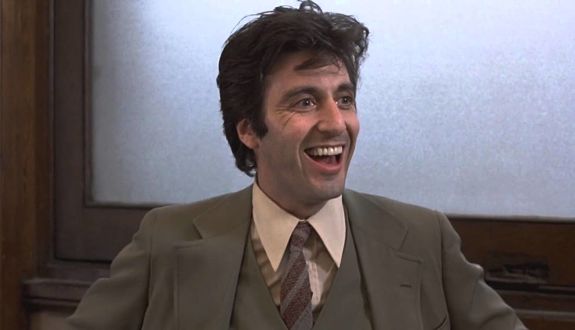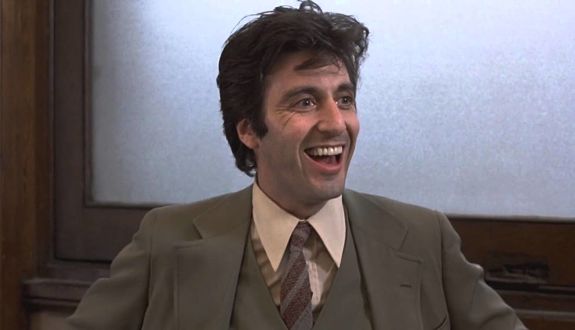…And Justice for All
- by
- May 12, 2016
- Entertainment, Legal Movies
- Reviewed by: Matt Riley


It’s time for the second installment of our new series, The Greatest Lawyer Movies of All Time, in which I review great courtroom dramas in no particular order. This week, on the advice of a student, I wanted to watch “A Few Good Men.” But in the end, I just couldn’t handle the truth. And by the truth, I mean paying $12.99. Why no rental option, iTunes? I need a Blockbuster right about now.
I decided to check out a lawyer movie with a slightly lower profile. I knew almost nothing about this movie going in, but I love me some Pacino. So after spending a very reasonable $3.99 to rent it, I dimmed the lights and tucked in for…
…And Justice for All
1979 dir. Norman Jewison
You get the feeling early on that “…And Justice for All” is hard movie to pin down. The film starts with a series of static courtroom images with children intoning the Pledge of Allegiance in voiceover. “One Nation under God, indivisible, with liberty and justice…” Ah, I see what they did there. At this point, you’re thinking that this film is going to offer high drama and soaring rhetoric, with (hopefully) lots of fiery Pacino yelling.
Then all of the sudden, some jazzy disco kicks in – I don’t even know what to call this music, but it’s got a lot of saxophone and it seems like it’s in every 80s movie ever, even the ones that came out in 1979. Is “…And Justice for All” a courtroom drama, or zany courtroom comedy?
It turns out it’s both. In an early sequence, a defendant on trial for lotto fraud tries to swallow the evidence. In another, a judge calls the court to order with a gunshot instead of a gavel. The inestimable Jeffrey Tambor shows up, and he and Pacino have an easy-going comic rapport.
At the same time, the movie has some serious things on its mind. When a trans woman gets booked at a local precinct, Pacino’s Arthur Kirkland, a one-of-the-good-ones defense attorney, looks on in disgust as the cops harass and humiliate her. He’s in jail himself, having been held in contempt for throwing a punch at a corrupt judge. The judge is refusing to hear exonerating evidence that would get an innocent man out of jail. The plot thickens when the same judge is brought up on charges of rape and taps Kirkland to represent him.
It feels like “…And Justice for All” is going for a kind of dark satire, its bizarre tonal shifts meant to express the absurdity of a broken system. The judges rush through proceedings and strike up deals. The lawyers are overworked, powerless to fight against the current for the little guy, and they’re often too numb to care. The guilty walk and the innocent languish in prison. Everyone’s crazy.
It’s easy to see “…And Justice for All” as misguided. Sometimes, it’s just plain weird. But I admire it for the technical difficulty. Black comedy is a hard genre to pull off.
But “Network” this is not. The absurdities feel contrived, and even if the anger is real, the systemic corruption portrayed in the film doesn’t quite track with real life. I’m no lawyer, but it seems like the filmmakers weren’t too worried about verisimilitude when it came to the details. It’s never clear what kind of lawyer Kirkland is – a public defender? There’s a hastily sketched “committee” conducting ethics reviews – who are these people? The appeals process, in this film, consists of haranguing the original judge to try to get him to change his mind. Attorneys shout things like, “He can’t ignore the statute!” You know, lawyering.
Still, despite its many flaws, there’s much to like about “…And Justice for All,” and an LSAT student looking for some courtroom-set entertainment could do much worse. (Spoiler: When Pacino gets to do Pacino, it’s awesome.) It paints a dark picture of our system, and while the particularities are mostly silly, the spirit of the critique is worth hearing out. In the end, “justice for all” is a fantasy. The film should really be called “…And Justice for Some!”
Oh wait, I see what they did there.
Search the Blog

Free LSAT Practice Account
Sign up for a free Blueprint LSAT account and get access to a free trial of the Self-Paced Course and a free practice LSAT with a detailed score report, mind-blowing analytics, and explanatory videos.
Learn More
Popular Posts
-
logic games Game Over: LSAC Says Farewell to Logic Games
-
General LSAT Advice How to Get a 180 on the LSAT
-
Entertainment Revisiting Elle's LSAT Journey from Legally Blonde








